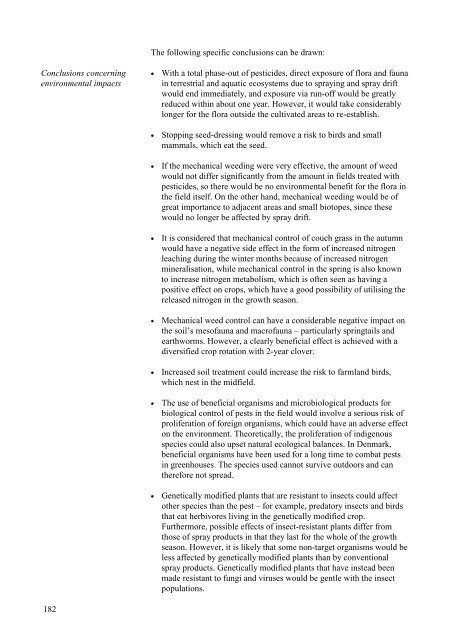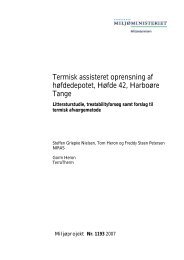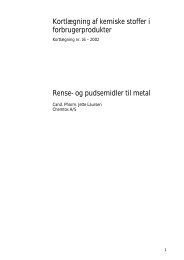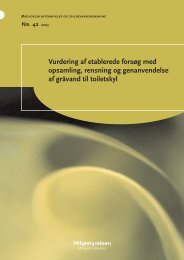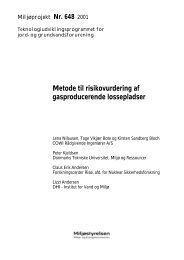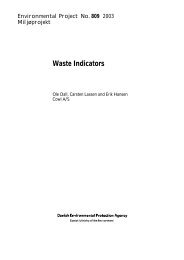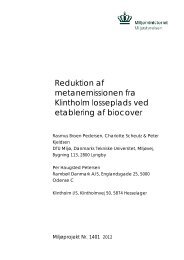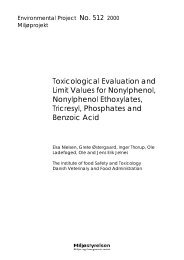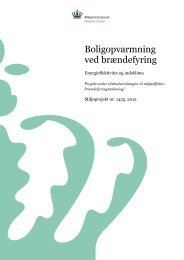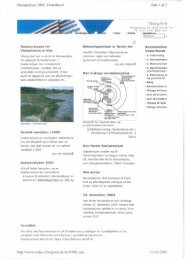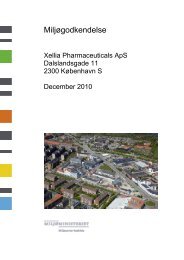Report from the Sub-comittee on the environment and health
Report from the Sub-comittee on the environment and health
Report from the Sub-comittee on the environment and health
Create successful ePaper yourself
Turn your PDF publications into a flip-book with our unique Google optimized e-Paper software.
C<strong>on</strong>clusi<strong>on</strong>s c<strong>on</strong>cerning<br />
envir<strong>on</strong>mental impacts<br />
182<br />
The following specific c<strong>on</strong>clusi<strong>on</strong>s can be drawn:<br />
• With a total phase-out of pesticides, direct exposure of flora <strong>and</strong> fauna<br />
in terrestrial <strong>and</strong> aquatic ecosystems due to spraying <strong>and</strong> spray drift<br />
would end immediately, <strong>and</strong> exposure via run-off would be greatly<br />
reduced within about <strong>on</strong>e year. However, it would take c<strong>on</strong>siderably<br />
l<strong>on</strong>ger for <str<strong>on</strong>g>the</str<strong>on</strong>g> flora outside <str<strong>on</strong>g>the</str<strong>on</strong>g> cultivated areas to re-establish.<br />
• Stopping seed-dressing would remove a risk to birds <strong>and</strong> small<br />
mammals, which eat <str<strong>on</strong>g>the</str<strong>on</strong>g> seed.<br />
• If <str<strong>on</strong>g>the</str<strong>on</strong>g> mechanical weeding were very effective, <str<strong>on</strong>g>the</str<strong>on</strong>g> amount of weed<br />
would not differ significantly <str<strong>on</strong>g>from</str<strong>on</strong>g> <str<strong>on</strong>g>the</str<strong>on</strong>g> amount in fields treated with<br />
pesticides, so <str<strong>on</strong>g>the</str<strong>on</strong>g>re would be no envir<strong>on</strong>mental benefit for <str<strong>on</strong>g>the</str<strong>on</strong>g> flora in<br />
<str<strong>on</strong>g>the</str<strong>on</strong>g> field itself. On <str<strong>on</strong>g>the</str<strong>on</strong>g> o<str<strong>on</strong>g>the</str<strong>on</strong>g>r h<strong>and</strong>, mechanical weeding would be of<br />
great importance to adjacent areas <strong>and</strong> small biotopes, since <str<strong>on</strong>g>the</str<strong>on</strong>g>se<br />
would no l<strong>on</strong>ger be affected by spray drift.<br />
• It is c<strong>on</strong>sidered that mechanical c<strong>on</strong>trol of couch grass in <str<strong>on</strong>g>the</str<strong>on</strong>g> autumn<br />
would have a negative side effect in <str<strong>on</strong>g>the</str<strong>on</strong>g> form of increased nitrogen<br />
leaching during <str<strong>on</strong>g>the</str<strong>on</strong>g> winter m<strong>on</strong>ths because of increased nitrogen<br />
mineralisati<strong>on</strong>, while mechanical c<strong>on</strong>trol in <str<strong>on</strong>g>the</str<strong>on</strong>g> spring is also known<br />
to increase nitrogen metabolism, which is often seen as having a<br />
positive effect <strong>on</strong> crops, which have a good possibility of utilising <str<strong>on</strong>g>the</str<strong>on</strong>g><br />
released nitrogen in <str<strong>on</strong>g>the</str<strong>on</strong>g> growth seas<strong>on</strong>.<br />
• Mechanical weed c<strong>on</strong>trol can have a c<strong>on</strong>siderable negative impact <strong>on</strong><br />
<str<strong>on</strong>g>the</str<strong>on</strong>g> soil’s mesofauna <strong>and</strong> macrofauna – particularly springtails <strong>and</strong><br />
earthworms. However, a clearly beneficial effect is achieved with a<br />
diversified crop rotati<strong>on</strong> with 2-year clover.<br />
• Increased soil treatment could increase <str<strong>on</strong>g>the</str<strong>on</strong>g> risk to farml<strong>and</strong> birds,<br />
which nest in <str<strong>on</strong>g>the</str<strong>on</strong>g> midfield.<br />
• The use of beneficial organisms <strong>and</strong> microbiological products for<br />
biological c<strong>on</strong>trol of pests in <str<strong>on</strong>g>the</str<strong>on</strong>g> field would involve a serious risk of<br />
proliferati<strong>on</strong> of foreign organisms, which could have an adverse effect<br />
<strong>on</strong> <str<strong>on</strong>g>the</str<strong>on</strong>g> envir<strong>on</strong>ment. Theoretically, <str<strong>on</strong>g>the</str<strong>on</strong>g> proliferati<strong>on</strong> of indigenous<br />
species could also upset natural ecological balances. In Denmark,<br />
beneficial organisms have been used for a l<strong>on</strong>g time to combat pests<br />
in greenhouses. The species used cannot survive outdoors <strong>and</strong> can<br />
<str<strong>on</strong>g>the</str<strong>on</strong>g>refore not spread.<br />
• Genetically modified plants that are resistant to insects could affect<br />
o<str<strong>on</strong>g>the</str<strong>on</strong>g>r species than <str<strong>on</strong>g>the</str<strong>on</strong>g> pest – for example, predatory insects <strong>and</strong> birds<br />
that eat herbivores living in <str<strong>on</strong>g>the</str<strong>on</strong>g> genetically modified crop.<br />
Fur<str<strong>on</strong>g>the</str<strong>on</strong>g>rmore, possible effects of insect-resistant plants differ <str<strong>on</strong>g>from</str<strong>on</strong>g><br />
those of spray products in that <str<strong>on</strong>g>the</str<strong>on</strong>g>y last for <str<strong>on</strong>g>the</str<strong>on</strong>g> whole of <str<strong>on</strong>g>the</str<strong>on</strong>g> growth<br />
seas<strong>on</strong>. However, it is likely that some n<strong>on</strong>-target organisms would be<br />
less affected by genetically modified plants than by c<strong>on</strong>venti<strong>on</strong>al<br />
spray products. Genetically modified plants that have instead been<br />
made resistant to fungi <strong>and</strong> viruses would be gentle with <str<strong>on</strong>g>the</str<strong>on</strong>g> insect<br />
populati<strong>on</strong>s.


